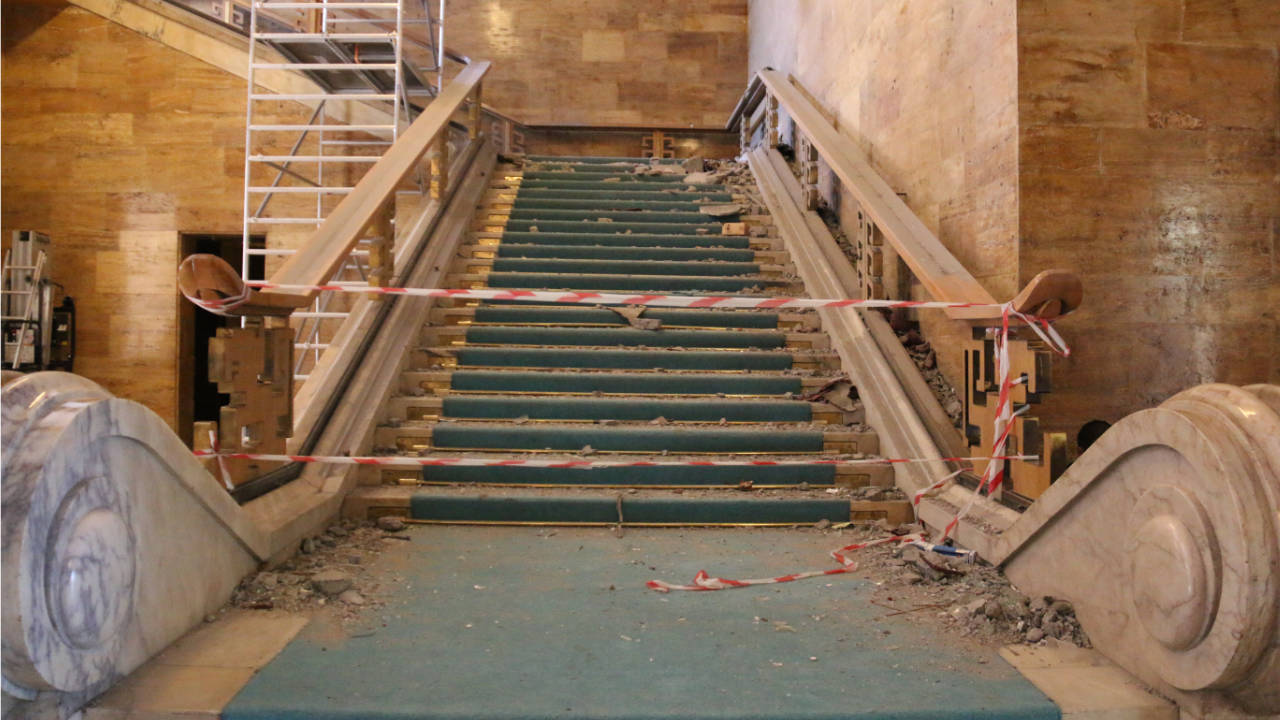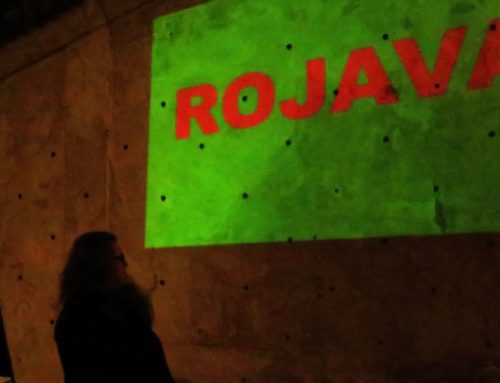By Mine Yildiz, Brussels
Recent developments in Turkey have created doubts in the democratic commitment of its leadership. These where counterbalanced by the analysis that the structure of the The Grand National Assembly of Turkey, the Turkish Parliament (TGNA) would be resilient enough to prevent a shift towards an autoritarian counrty. My research focussed therefore on the question if the TGNA will be able to fulfill these expectations.
After having lost the First World War, the Ottoman Empire saw itself reduced as well to one seventh of its original territory. This change created doubts if the 600 year old structure of that empire would be adequate frame for 20th century; Mustafa Kemal Atatürk played a key role in this process. Linked to the wish of having an entity representing the will of the people, a parliament was created in 1920 – even before the adoption of the Anayasa (Constitution of Turkey). Since then, this Türkiye Büyük Millet Meclisi (TGNA) is a cornerstone of the Republic of Turkey. The constitution from 1921 (and all the three follow-up texts) defined the key role of the TGNA for the republic and its structure. With the formal end of the Ottoman Empire, voted in the TGNA, a republic arose as a secular state, including key elements of Western culture, politics and legislation – with the TGNA as stable factor.
During the 100 years of its existence, the TGNA survived structurally several coups d’état and – since 2002 – a more and more autocratic leadership.
Despite its structural importance for the existence of the Turkish Republic, there is only academic research on the policies, politics and political outreach of the TGNA – but not a single PhD on the internal structure and on those who are the sort of ‘machine’ in that institution.
After a career in academics and as parlimentry assistant (PA) of members of parliament (MPs), I took the decision to approach this issue. The outcome is a PhD, which is not only a description of the factual situation but as well an indirect picture of the understanding and practice of paternalism, patronage, clientelism, nepotism and lack of transparency in the Turkish political system.
As a political scientist with interest and a passion in parliamentary democracy, democratisation and rule of law, I was accepted to work in the TGNA as a PA for – over the years – eight MPs from social democratic parties. The experience, having been educated at one of the leading universities in Turkey and working inside that key legislative body of the Turkish Republic challenged my analytical mind.
Having become an insider, I discovered more and more elements which where in contradiction with the (idealistic?) perception of the TGNA in the academic world. I decided therefore to start a PhD on the internal functioning of the TGNA and the role of its staff. A high profile professor from my (public) university, accompanied by a similarly qualified academic from a (private) university accepted to accompany, advise, challenge and guide me during that work – being aware that the (possible) publication of structural failures in the functioning of the TGNA might endanger their academic career.
The starting point of that PhD was the description and analysis of the historical development, the legislative proceedings, the procedure, the method and today’s importance of legislative assemblies as a platform of political representation, followed by the discussions concerning the ‘parliamentary crisis’ with the assumption that the importance of legislative assemblies have decreased since the beginning of the 20th century. This led to the cyclical factors affecting the institutionalisation and efficiency of the TGNA, linking it to the effects resulting out of the rules of procedure, the relationship legislative-executive, historic working methods of the TGNA, the role of political parties and intra-party democracy, election systems (election law), snap elections, the effect of corruption and several political-economic crises – and the effect of military interventions.
The institutional structure of the TGNA has been examined (administrative and functional organisation), followed by the analysis of the functioning of the different political structures and administrative units under the roof of the Secretary General. All of that was compared with the situation in parliaments of other countries, especially in EU member states, the United States, Canada, Norway and Israel.
“How, why, when, with the interference of whom and under what conditions, staff is entering to service the TGNA”, was the next key question to address – compared to international practice. The answer showed that the factual situation is not yet what it should be according to the standards of a modern 21th century democracy – but the situation is as well an indirect picture of the understanding and practice of paternalism, patronage, clientelism, nepotism and lack of transparency in the general Turkish political system.
The literature concerning this research field is relatively small. I used the standard literature on the general development of parliamentarism. The literature on Turkey is mostly descriptive and very often biased.
Academic work on legislative assemblies has been very limited in Turkey, a real gap. In my research, a general evaluation was made on the legislative assemblies and the factors affecting the legislative process and the question of whether the worldwide parliamentary crises was also valid for the TGNA.
Emphasis was placed on the importance of the TGNA organisational structure, and the parliamentary administrative support contribution to the legislative activities followed by recommendations for an efficient and productive general parliament work in the future.
The most comprehensive way of presenting the results might be by enumerating them in eleven points:
1. The research proofed that the TGNA, this legislative body of the Turkish Republic, has structural problems.
2. The main reason for these structural problems are the changes in the political structure (democratic period followed by coup d’état, military intervention … and so on …).
3. These structural problems find their expression in the field of human resources and the division of labor – leading to a lack of efficiency.
4. In this context, I could prove that an important percentage of staff, especially the PAs, is chosen in a process influenced by political favoritism and nepotism.
5. This leads often to the employment of staff which often don’t have the necessary political and bureaucratic qualifications (education, training and experience); reducing the number of highly qualified staff.
6. The main tasks of a PA are – in close cooperation with the MP – direct contact with constituents and visitors, sometimes even assisting in private business and facilitating the life of family members of the MP.
7. Only a small percentage of working time of a PA is aiming towards direct legislative work, a reality different from the one in developed democracies in Western Europe and North America.
8. The PAs are involved as well in the activities of the MP in their political parties (a practice banned in most Western countries – a separation between parliament work and party work is not (yet) existing.
9. The work of a PA is considered by the (political and general) public in Turkey as a high-profile activity – due to the close contact to key political actors.
10. An important number of PAs is considering their work in the TGNA as a key step towards a follow-up in a higher position in government (ministry and other administration), party (party structure, nomination as electoral candidate) or (better paid) in the private sector.
11. The weaknesses of the human resource management in the TGNA are a reflection of the political culture in the country.
PS: The publication of this PhD created an unusual attention – because of its content and its analysis it was considered as a profound critique of the internal functioning of the TGNA and challenge for the future work of this Turkish legislative body.
(This article is an enlarged abstract of my PhD «The legislative work of assistants of members of parliament in Turkey », focusing on internal structural deficits of the Turkish Parliament – an issue without any precedent academic publication in another language than Turkish.)
Cover picture: The OSCE PA Delegation inspects damage on the parliament building, Ankara, 16 August 2016; Foto: OSCE Parliamentary Assembly CC BY-SA 2.0 via FlickR
Auch ein Blog verursacht Ausgaben ...
… Wenn Ihnen / Euch Europa.blog gefällt, dann können Sie / könnt Ihr uns gerne auch finanziell unterstützen. Denn auch der Betrieb eines Blogs ist mit Kosten verbunden für Recherchen, Übersetzungen, technische Ausrüstung, etc. Eine einfache Möglichkeit uns mit einem kleinen einmaligen Betrag zu unterstützen gibt es hier:
About the author

Foto: private
Dr. Mine Yildiz, Coordinator Middle East, BDA-VUB
Mine Yildiz holds a doctorate in political science (Hacettepe University, Ankara, Turkey). Having grown up in the Western part of Anatolia in a family of trade union leaders, she became the first woman of her family entering a university.
She studied 1990-1992 sociology at the Cumhuriyet University in Sivas and moved to the more renowned Hacettepe University, where 1994 she obtained her Bachelor. As she discovered that politics is her passion, she changed 1995 to Gazi University for a Master in Public Administration, Political and Social Sciences while continuing 1995-1997 as research assistant at the Cumhuriyet University as well as from 1997 as assistant in the Turkish Parliament. After a master in 2001, she started her PhD and continued for eighteen years as assistant for (altogether eight different) Members of Parliament of Turkish Social Democratic Parties (DSP, CHP).
To have a broader political outreach, she started to write newspaper articles (BirGün, Brusselstimes, Cumhuriyet, europa.blog, Haber Sol, İleri Haber, Mülkiye Haber). In 2009, she obtained her PhD (Comparative analysis of parliament assistants in the Turkish Parliament, Türkiye’de Yasama İşlevi Açısından Milletvekili Danışmanlığı).
2013-2014, she taught at the Ankara Başkent University in the department of Political Sciences and International Relations (Communication and Politics). 2016, she moved with her daughter to Belgium: Visiting Researcher at the IES of the VUB and since 2019 Associate Researcher (focusing on the influence and impact of Turkey on immigrant-origin Members of Parliament in EU countries). 2020-now Middle East Coordinator, Brussels Diplomatic Academy (BDA), VUB.
She was one of eight recipients of the “European International Women’s Leadership Award” which was handed over in the European Parliament in 2019.
4274






Leave A Comment